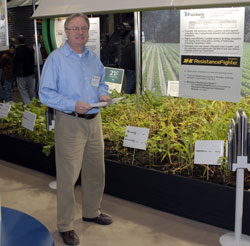 Dr. Clarence Swanton was here at the National Farm Machinery Show today. He’s a researcher from the University of Guelph, Ontario who’s done research on the mechanism of yield loss. He was in the Syngenta booth to talk to growers about yield protection.
Dr. Clarence Swanton was here at the National Farm Machinery Show today. He’s a researcher from the University of Guelph, Ontario who’s done research on the mechanism of yield loss. He was in the Syngenta booth to talk to growers about yield protection.
I think his research is fascinating because he’s looking into the environment in which a seedling grows, especially right after emerging, and how that affects the plant at harvest time. Apparently this is much more important than previously thought. According to his research it’s so important that if a seedling gets off to a poor start it’s very difficult to make up for the damage to harvest yield potential even if steps are taken later in the season.
I interviewed Dr. Swanton before he had to return home to find out just what the impact of early season weed control has on a farmer’s bottom line.
Listen to my interview with Dr. Swanton here (4 min): nfms-07-swanton.mp3
AgWired coverage of the National Farm Machinery Show
is being sponsored by:  and
and 

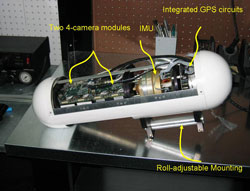 One of the cool things John Deere is talking about in their booth here at the National Farm Machinery Show is their
One of the cool things John Deere is talking about in their booth here at the National Farm Machinery Show is their 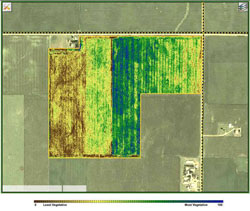 The pictures that are produced by the system provide images like this “Normalized Difference Vegetative Index.” As soon as the pictures are available Jeff says farmers can analyze them or work with their local retailer or consultant to interpret them and the data can be easily integrated into precision ag systems or whatever type of farm management program is being used.
The pictures that are produced by the system provide images like this “Normalized Difference Vegetative Index.” As soon as the pictures are available Jeff says farmers can analyze them or work with their local retailer or consultant to interpret them and the data can be easily integrated into precision ag systems or whatever type of farm management program is being used.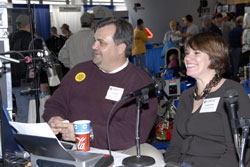 This show has been interesting from the media standpoint since we don’t really have a common location to work from. Usually all of us media types can work side by side in relative peace and quiet away from the crowds. This afternoon I did a walk around and found some of my media buddies working in various places.
This show has been interesting from the media standpoint since we don’t really have a common location to work from. Usually all of us media types can work side by side in relative peace and quiet away from the crowds. This afternoon I did a walk around and found some of my media buddies working in various places.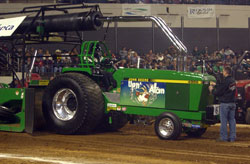 I don’t know if you’ve had the chance to experience a tractor pull, much less one that’s indoors. One of the interesting aspects of it is the fact that the exhaust has to be routed through a tube called the “pipe.” They claimed that this was a new and improved pipe but right before I left it broke and let’s just say it’s a good thing they have a great air movement system in the arena. So here’s what these things look and sound like. This tractor is called Up ‘n’ Atom.
I don’t know if you’ve had the chance to experience a tractor pull, much less one that’s indoors. One of the interesting aspects of it is the fact that the exhaust has to be routed through a tube called the “pipe.” They claimed that this was a new and improved pipe but right before I left it broke and let’s just say it’s a good thing they have a great air movement system in the arena. So here’s what these things look and sound like. This tractor is called Up ‘n’ Atom.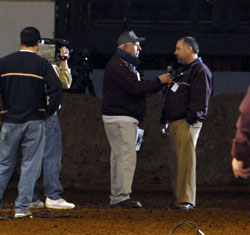 Getting back to the National Farm Machinery Championship Tractor Pull, which is sponsored by Syngenta . . . The opening ceremony included remarks from Ron Cowman, Syngenta area sales representative (pictured on the right). I hope I have his name spelled right.
Getting back to the National Farm Machinery Championship Tractor Pull, which is sponsored by Syngenta . . . The opening ceremony included remarks from Ron Cowman, Syngenta area sales representative (pictured on the right). I hope I have his name spelled right.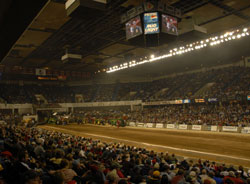 I thought I would go to tonight’s tractor pull competition for just a little while and wound up staying way longer than I intended. This is my first indoor tractor pull. Thank goodness and Syngenta for that considering how cold it is outside.
I thought I would go to tonight’s tractor pull competition for just a little while and wound up staying way longer than I intended. This is my first indoor tractor pull. Thank goodness and Syngenta for that considering how cold it is outside.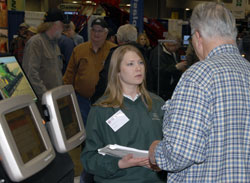 If precision farming is the new revolution in agriculture then John Deere has it on display here so growers can get their hands on it. Chrystal Schuck works in the Ag Management Solutions area of John Deere. This is a division in John Deere that uses gps receivers and on-display mapping to reduce costs to growers and allow them to keep records from year to year.
If precision farming is the new revolution in agriculture then John Deere has it on display here so growers can get their hands on it. Chrystal Schuck works in the Ag Management Solutions area of John Deere. This is a division in John Deere that uses gps receivers and on-display mapping to reduce costs to growers and allow them to keep records from year to year.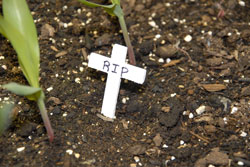 I don’t think Syngenta held a eulogy for the dead black cutworms in their corn planter but the RIP signs are a nice touch.
I don’t think Syngenta held a eulogy for the dead black cutworms in their corn planter but the RIP signs are a nice touch. 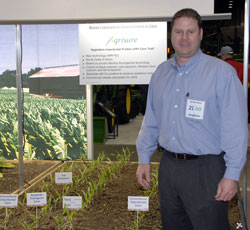 He says that Syngenta received approval on several new stacked traits of which some are on display here through the planter demonstration and some aren’t. One of those new stacked traits contains corn borer and rootworm control and Liberty tolerance all in one.
He says that Syngenta received approval on several new stacked traits of which some are on display here through the planter demonstration and some aren’t. One of those new stacked traits contains corn borer and rootworm control and Liberty tolerance all in one. 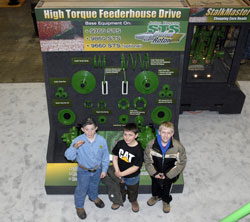 I’m taking lots of pictures here at the National Farm Machinery Show and of course they’re in an online photo album. I’m sure I’ll get a wide variety by the time I’m done and I’ll add new ones each day. These boys posed in the John Deere booth for me this afternoon.
I’m taking lots of pictures here at the National Farm Machinery Show and of course they’re in an online photo album. I’m sure I’ll get a wide variety by the time I’m done and I’ll add new ones each day. These boys posed in the John Deere booth for me this afternoon.